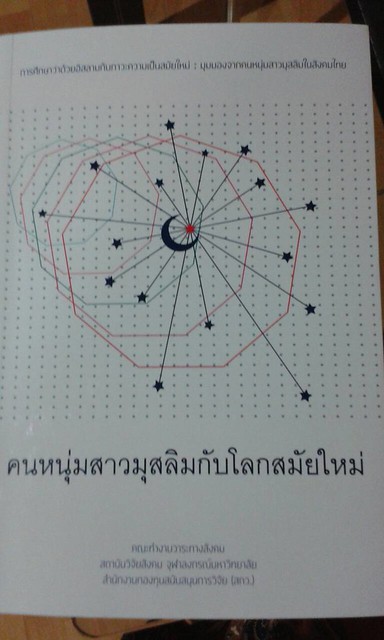
'Muslim Youth and the Modern World', the book was based on research a few years ago commissioned by Thailand Research Fund, Chulalongkorn University's Social Research Institute.
New generations of Thai Muslims have emerged to challenge the conventional self-introverted interpretation of Islam and go in search of a courageous embracing of modernity and understanding of complex contemporary society. The launch of a 792-page book 'Muslim Youth and the Modern World' at Chulalongkorn University on Thursday revealed that Thai Muslim youths have done some soul-searching about the relevance of Islam in the contemporary world.
Amporn Marddent, lecturer in culture studies at Walailak University, said young Muslim women have been more active in reasserting and expressing their cultural identity such as wearing the hijab head cover. By adhering to traditional attire, the young Muslim women have not only displayed the hijab, as a symbol of struggle in the wider social context but also renewed their own subtle interpretation of the religion, said Ms Amporn, one of the 16 writers featured in the book.
Nipon Sohheng, lecturer in political science at Ramkamhaeng University, said Islamic modernism was a reactive struggle by progressive Muslims around the world, including Thailand, to stay afloat with a meaningful engagement of modernity. Examples of embracing new socio-economic patterns in Thailand, said Mr Nipon, included the emergence of Islamic Bank operations so that Muslims could engage in the contemporary economic world but still maintain their religious way of life. Even in the education field, he said, a variety of schools and colleges in Islamic studies have emerged in the fields of both religion and the social sciences, in the Deep South as well as in Bangkok, as an adaptation to seek a more in-depth understanding of Islam in the modern world.
Bukhoree Yeema, ASEAN Studies Centre Director at Songkhla Rajabhat University, has reaffirmed that democracy is not in conflict with Islamic principles as the ancient Constitution of Medina referred to democratic elements such as the rule of law, people’s participation, and accountability. The failures of some democracies in the Islamic world, said Assistant Professor Bukhoree, were actually due to socio-economic mismanagement.
"Most of them were former colonies and in building the nation-state, loopholes caused imbalances in the economic and social structures allowing small elites to reap the benefits of modernization. In fact, this failure is similar to other developing countries," said Dr Bukhoree.
Zakee Pitakkhumpol, of the Institute of Peace Studies of Prince of Songkhla University, Hat Yai Campus, said religious leaders have yet to adjust to the complexities of society.
Zakee has studied different types of people, including the non-straight-gender Muslims and the young generations of certain Muslim groups such as Tablighi and Dawah, who have had to reconcile their personal sexual and identity preferences with the religious teachings. "We could not easily despise them as bad people, but how shall we accommodate them as human beings and members Ummah (Islamic co-religionists)?" questioned. Mr Zakee.
Pratubjit Neelapaijit, of the Institute of Human Rights and Peace Studies at Mahidol University, challenged the adherence of Islamic purified states to convention when there was in fact diversity and nuances; younger generations of Muslim scholars should question the old discourse to keep Islam relevant to modernity and the complexity of each locality.
Anis Toleb, internet expert and volunteer at the Muslims for Peace group, said Islam did not deny the technology or innovations of other religions.
Hafissa Salae, a young businesswoman, said Muslim women have empowered themselves in light of the crisis that bombarded their families and communities. They have succeeded in raising their families as their husbands were either killed or jailed, such as those in Deep South, and in keeping the military away from their neighbourhood, said Ms Hafissa.
Imron Sohsan, lecturer of humanities and social science at Khon Kaen University, studied Muslims in Surin province and concluded that only by adjusting to and accommodating cultural and ethnic diversity could Islam stay relevant and playing even a dominant role in economic and political activities in environments where they were actually minorities.
Chaiwat Satha-Anand, political science professor at Thammasat University, said that Muslim youths in the contemporary world could be both a threat to their own identity and a promising symbol of change for the better.
When they engaged more intellectually and earnestly in the history of Islam and their localities, then there would be hope for a rich, relevant and engaging Islam in the contemporary world, said. Dr Chaiwat.
Prachatai English is an independent, non-profit news outlet committed to covering underreported issues in Thailand, especially about democratization and human rights, despite pressure from the authorities. Your support will ensure that we stay a professional media source and be able to meet the challenges and deliver in-depth reporting.
• Simple steps to support Prachatai English
1. Bank transfer to account “โครงการหนังสือพิมพ์อินเทอร์เน็ต ประชาไท” or “Prachatai Online Newspaper” 091-0-21689-4, Krungthai Bank
2. Or, Transfer money via Paypal, to e-mail address: [email protected], please leave a comment on the transaction as “For Prachatai English”
